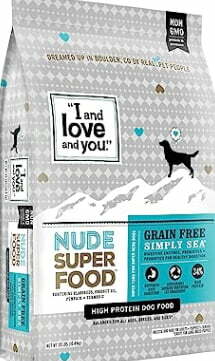The Best 10 Superfoods for Dogs

Introduction
As responsible pet owners, we all want the best superfoods for dogs and our furry companions. Just like humans, dogs require a balanced and nutritious diet to thrive. Incorporating superfoods into your dog’s meals can provide a powerful nutritional boost, promoting overall health, longevity, and vitality. In this article, we’ll explore the top 10 superfoods for dogs that can enhance their well-being and keep their tails wagging with delight.

What is Superfoods
Superfoods are a group of nutrient-dense foods that are particularly rich in vitamins, minerals, antioxidants, and other beneficial compounds. These foods are believed to provide numerous health benefits and are often associated with promoting overall well-being and reducing the risk of certain diseases.
The term “superfood” gained popularity in the health and wellness industry and is used to describe foods that go beyond basic nutrition, offering additional health advantages due to their exceptional nutrient content. While the term is not a scientific classification, it has been widely adopted in popular culture to highlight certain foods’ nutritional prowess.
Superfoods can come from various categories, including fruits, vegetables, nuts, seeds, whole grains, fish, and other plant-based sources. Some commonly recognized superfoods include:
1. Berries: Blueberries, strawberries, acai berries, and goji berries are known for their high antioxidant content and potential anti-inflammatory properties.
2. Leafy Greens: Spinach, kale, and Swiss chard are packed with vitamins, minerals, and phytonutrients that support overall health.
3. Nuts and Seeds: Almonds, chia seeds, flaxseeds, and walnuts are rich in healthy fats, fiber, and essential nutrients.
4. Fish: Salmon, sardines, and mackerel are excellent sources of Omega-3 fatty acids, which benefit heart health and brain function.
5. Whole Grains: Quinoa, oats, and brown rice are nutrient-rich grains that provide essential carbohydrates and fiber.
6. Legumes: Chickpeas, lentils, and black beans offer protein, fiber, and a variety of vitamins and minerals.
7. Cruciferous Vegetables: Broccoli, cauliflower, and Brussels sprouts are known for their cancer-fighting properties.
8. Avocado: Rich in healthy monounsaturated fats and various nutrients, avocados are beneficial for heart health.
9. Turmeric: This spice contains curcumin, which has powerful anti-inflammatory properties.
10. Greek Yogurt: A probiotic-rich dairy product that supports gut health.
It’s important to note that while superfoods can be part of a healthy diet, they should not be seen as a replacement for a balanced and diverse overall diet. A diet based on a variety of whole, minimally processed foods is key to obtaining a wide range of nutrients and promoting optimal health.

Best 10 Superfoods for Dogs products details here:
1. Salmon
Salmon is an excellent source of high-quality protein and Omega-3 fatty acids, which are essential for promoting healthy skin and a shiny coat in dogs. These fatty acids also play a crucial role in supporting joint health and cognitive function, reducing inflammation, and boosting the immune system. Feeding your dog cooked, boneless salmon in moderation can be a great addition to their diet.

Salmon fish
2. Blueberries
Rich in antioxidants, vitamins, and fiber, blueberries are a fantastic superfood for dogs. Antioxidants help combat free radicals and reduce cellular damage, contributing to overall well-being and a strong immune system. Additionally, blueberries can aid in maintaining cognitive function and supporting heart health.

Blueberries
3. Sweet Potatoes
Sweet potatoes are a great source of complex carbohydrates, fiber, and essential vitamins like A and C. They are a healthier alternative to regular potatoes and can be beneficial for dogs with food allergies or sensitivities. The fiber in sweet potatoes aids in digestion and supports gut health while the vitamins strengthen the immune system.
4. Spinach
Spinach is packed with nutrients, including iron, calcium, and vitamins A, C, and K. It is also a good source of plant-based protein, making it an excellent addition to a dog’s diet. Spinach supports bone health, promotes a healthy heart, and aids in proper blood clotting.
5. Pumpkin
Not only is pumpkin low in calories, but it is also rich in fiber, making it an ideal superfood for dogs prone to weight issues. Additionally, pumpkin is packed with beta-carotene, which supports eye health and the immune system. The soluble fiber in pumpkin can also help with digestive issues and regulate bowel movements.

Pumpkin
6. Coconut Oil
Coconut oil is a powerhouse of healthy fats, including medium-chain triglycerides (MCTs). MCTs are easily digestible and quickly converted into energy, making coconut oil an excellent source of fuel for active dogs. It can also improve skin and coat health, aid in digestion, and possess antimicrobial properties that may benefit a dog’s immune system.
7. Chia Seeds
Chia seeds are rich in Omega-3 fatty acids, fiber, protein, and essential minerals like calcium, phosphorus, and manganese. These tiny seeds can aid in maintaining healthy joints, promoting a shiny coat, and supporting proper digestion. As a bonus, they can help regulate blood sugar levels and maintain a healthy weight.
8. Greek Yogurt
Greek yogurt is a probiotic-rich superfood that can improve gut health in dogs. It contains beneficial bacteria that support a healthy balance of gut flora, leading to better digestion and nutrient absorption. Additionally, Greek yogurt is an excellent source of protein and calcium, which are essential for muscle and bone health.
9. Broccoli
Broccoli is a nutrient-dense vegetable, offering vitamins C and K, as well as fiber and antioxidants. While it should be fed in moderation, broccoli can provide numerous health benefits for dogs, such as supporting the immune system, aiding in detoxification, and promoting eye health.
10. Quinoa
Quinoa is a gluten-free grain that provides a complete protein profile, containing all essential amino acids. It also offers fiber, vitamins, and minerals, including magnesium and phosphorus. Quinoa can be a great alternative to traditional grains for dogs with food sensitivities or allergies.

Quinoa
How can believe superfoods for dogs?
Believing in the concept of “superfoods” for dogs requires understanding the scientific evidence behind the nutritional benefits of specific foods. Superfoods, in the context of pet nutrition, refer to foods that are exceptionally nutrient-dense and offer numerous health benefits. When considering superfoods for dogs, it is essential to rely on credible sources, such as veterinary nutritionists and peer-reviewed research, rather than anecdotal or unsupported claims.
Here are some steps to evaluate and believe in the concept of superfoods for dogs:
1. Consult with a Veterinarian: Before incorporating any new foods into your dog’s diet, consult with a qualified veterinarian. They can guide your dog’s specific nutritional needs, potential allergies or sensitivities, and whether the superfoods you’re considering are appropriate for your dog’s health.
2. Research Scientific Evidence: Look for scientific studies and research articles published in reputable journals that explore the nutritional benefits of the superfoods you are interested in. Evidence-based research is essential in understanding the potential health impacts of specific foods on dogs.
3. Understand Nutritional Needs: Dogs have specific nutritional requirements, including essential nutrients like proteins, carbohydrates, fats, vitamins, and minerals. Any superfood should complement and supplement a well-balanced diet that meets these needs.
4. Recognize Individual Variation: Just like humans, each dog is unique, and their nutritional needs may vary. What works as a superfood for one dog might not be suitable for another. Consider your dog’s age, breed, size, activity level, and any existing health conditions when choosing superfoods.
5. Avoid Excessive Supplementation: While some superfoods offer health benefits, excessive supplementation can lead to imbalances or nutrient toxicity. Moderation is key, and superfoods should be part of a varied diet rather than the sole source of nutrition.
6. Choose Safe Superfoods: Some foods that are considered superfoods for humans may be toxic to dogs. For example, certain fruits like grapes and raisins, as well as some nuts and chocolate, are harmful to dogs and should be avoided.
7. Balance with Regular Diet: Superfoods should be used to supplement a regular, balanced diet, not replace it. Ensure that the superfoods you choose do not displace essential nutrients provided by your dog’s regular food.
8. Monitor Health and Behavior: After incorporating superfoods into your dog’s diet, pay attention to any changes in their health, behavior, or digestive patterns. If you notice any adverse reactions, discontinue the new food and consult your veterinarian.
9. Be Skeptical of Unsubstantiated Claims: The term “superfood” is often used loosely in marketing, and some claims may be exaggerated or lack scientific backing. Be cautious of sensationalized claims and look for evidence-based information.
In conclusion, believing in superfoods for dogs involves a thoughtful and evidence-based approach. Consult with a veterinarian, do your research, and consider your dog’s individual needs and health status before incorporating any superfoods into their diet. A balanced, well-rounded diet is the foundation of a healthy canine companion, and superfoods can be a beneficial addition when chosen wisely and fed in moderation.

What is the difference between superfood and normal food for dogs?
The main difference between superfoods and normal food for dogs lies in their nutrient density and potential health benefits. Let’s explore the distinctions:
1. Nutrient Density:
Superfood for Dogs: Superfoods are nutrient-dense foods that contain higher levels of essential vitamins, minerals, antioxidants, and other beneficial compounds compared to regular foods. These foods often offer specific health advantages beyond basic nutrition.
Normal Food for Dogs: Regular dog food provides essential nutrients necessary for a dog’s daily dietary requirements. While it meets their basic nutritional needs, it may not contain the concentrated levels of nutrients found in superfoods.
2. Health Benefits:
Superfood for Dogs: Superfoods are believed to provide various health benefits, such as supporting immune function, improving skin and coat health, promoting joint health, aiding digestion, and offering targeted nutritional advantages.
Normal Food for Dogs: Regular dog food provides a balanced diet to meet a dog’s general nutritional requirements and supports overall health. While it fulfills their basic needs, it may not offer the additional targeted benefits that superfoods can provide.
3. Specific Nutrients:
Superfood for Dogs: Superfoods are often selected for their high levels of specific nutrients or bioactive compounds that contribute to their superfood status. For example, foods like salmon are rich in Omega-3 fatty acids, which are beneficial for skin and coat health.
Normal Food for Dogs: Regular dog food aims to provide a balanced mix of essential nutrients, such as proteins, carbohydrates, fats, vitamins, and minerals, without focusing on high concentrations of specific compounds as superfoods do.
4. Addition vs. Main Diet:
Superfood for Dogs: Superfoods are usually added as supplements, treats, or additions to a dog’s regular diet. They are not meant to replace the main diet but rather to enhance it with additional nutrients and health benefits.
Normal Food for Dogs: Regular dog food serves as the primary source of nutrition for dogs and is designed to meet their overall dietary needs. It forms the foundation of their diet.
In summary, the key difference between superfoods and normal food for dogs lies in the nutrient density and specific health benefits offered. Superfoods are nutrient-packed options that provide targeted health advantages when incorporated into a dog’s diet, while normal food for dogs serves as their balanced and essential nutritional base. Combining both superfoods and regular dog food ensures a well-rounded and nutritious diet for your canine companion.

Expert Advice: Superfoods for Dogs – Boosting Health and Well-being
As an expert in canine nutrition, I’m here to provide you with valuable advice on incorporating superfoods into your dog’s diet to enhance their health and well-being:
1. Consult with a Veterinarian: Before introducing any new foods, including superfoods, into your dog’s diet, consult with a qualified veterinarian. They can assess your dog’s individual nutritional needs, and any existing health conditions, and provide personalized recommendations.
2. Focus on Nutrient-Dense Foods: Choose superfoods that are packed with essential nutrients like vitamins, minerals, and antioxidants. Look for foods that offer specific health benefits, such as improved skin and coat, joint health, or a stronger immune system.
3. Balance and Moderation: While superfoods can be beneficial, they should not replace a balanced diet. Ensure that the superfoods you choose complement your dog’s regular food and don’t cause nutrient imbalances. Feed superfoods in moderation to avoid over-supplementing.
4. Identify Safe Superfoods: Some human superfoods can be toxic to dogs. For instance, avoid grapes, raisins, chocolate, onions, and garlic, as they can be harmful. Instead, focus on safe options like blueberries, sweet potatoes, spinach, and salmon.
5. Cooking and Preparation: When preparing superfoods for your dog, avoid adding harmful ingredients like salt, spices, or sugary sauces. Cook foods without seasoning or opt for raw options, depending on your dog’s specific dietary needs.
6. Consider Your Dog’s Preferences: Not all dogs may enjoy certain superfoods. Explore various options to discover your dog’s preferred choices. Always introduce new foods gradually to prevent digestive upset.

7. Rotate Superfoods: Variety is essential for a well-rounded diet. Rotate different superfoods to provide a broader range of nutrients and keep mealtime exciting for your furry friend.
8. Monitor Your Dog’s Health: Pay attention to any changes in your dog’s health, behavior, or digestion after introducing superfoods. If you notice any adverse reactions, discontinue the new food and consult your veterinarian.
9. Avoid Overfeeding: Even superfoods should be given in appropriate portions. Overfeeding can lead to weight gain and potential health issues. Adjust the number of superfoods based on your dog’s size, age, and activity level.
10. Combine Superfoods with High-Quality Dog Food: Superfoods can be a great addition to your dog’s diet, but they should not replace balanced and high-quality dog food. Select a trustworthy dog food brand that caters to your dog’s unique nutritional needs.
In conclusion, incorporating superfoods into your dog’s diet can provide numerous health benefits when done right. Always seek expert advice from a veterinarian, focus on nutrient-dense and safe options, and ensure moderation and balance in your dog’s diet. With the proper approach, superfoods can contribute to a healthier and happier life for your beloved canine companion.
Buying Guide: Selecting Superfoods for Dogs – Enhancing Their Health and Nutrition
When choosing superfoods for your furry companion, it’s crucial to prioritize their health and nutritional needs. Follow this comprehensive buying guide to make informed decisions and ensure you’re providing the best superfoods for your dog:
1. Consult with a Veterinarian: Before incorporating any new superfoods into your dog’s diet, consult with a qualified veterinarian. They can assess your dog’s specific nutritional requirements, and any existing health conditions, and advise on suitable superfoods.
2. Research Superfoods for Dogs: Thoroughly research different superfoods that are safe and beneficial for dogs. Look for reputable sources such as veterinary websites, pet nutrition experts, and scientific studies.
3. Focus on Nutrient-Dense Options: Choose superfoods that are nutrient-dense and offer essential vitamins, minerals, and antioxidants. Look for foods that specifically address your dog’s needs, such as improved coat health, joint support, or immune system boost.
4. Identify Safe Superfoods: Not all superfoods for humans are safe for dogs. Avoid toxic foods such as grapes, raisins, chocolate, onions, and garlic. Instead, opt for dog-friendly superfoods like blueberries, sweet potatoes, pumpkin, and salmon.
5. Consider Your Dog’s Preferences: Each dog may have different taste preferences. Experiment with various superfoods to find what your dog enjoys most. Introduce new foods gradually to avoid digestive issues.
6. Choose High-Quality Sources: Opt for high-quality superfoods sourced from reputable brands or suppliers. Select fresh and natural options whenever possible to ensure your dog receives the best nutrition.
7. Avoid Artificial Additives: When purchasing superfood treats or supplements, check the ingredient list for artificial additives, preservatives, and fillers. Choose products with minimal and wholesome ingredients.
8. Look for Certified Organic: Organic superfoods can provide additional assurance of their purity and quality. Look for products with organic certifications to ensure they are free from harmful pesticides and chemicals.
9. Check for Allergens: If your dog has food allergies or sensitivities, carefully read the ingredient list to avoid potential allergens. Introduce new superfoods slowly and monitor your dog’s reaction.
10. Monitor Your Dog’s Health: After introducing superfoods into your dog’s diet, observe their health, behavior, and digestion. In case of any unfavorable reactions, stop feeding the food and seek advice from your veterinarian.
11. Buy in Appropriate Quantities: Superfoods have varying shelf lives, so buy them in quantities that your dog can consume within a reasonable time frame. Stale or expired superfoods may lose their nutritional value.
12. Compare Prices and Packaging: Compare prices of different brands and packaging sizes to find the best value. Buying in bulk or larger quantities may be more cost-effective in the long run.
By following this buying guide, you can confidently select superfoods that enhance your dog’s health, promote well-being, and add variety to their diet. Remember, a balanced diet, combined with suitable superfoods, contributes to your dog’s overall health and happiness.

Frequently Asked Questions (FAQ) on Superfoods for Dogs
1. What are superfoods for dogs?
Superfoods for dogs are nutrient-dense foods that offer exceptional health benefits. They are rich in essential vitamins, minerals, antioxidants, and healthy fats, supporting your dog’s overall well-being and providing targeted health benefits.
2. Why should I feed my dog superfoods?
Feeding your dog superfoods can enhance their health, improve their immune system, promote healthy skin and coat, support joint health, aid digestion, and offer other specific health benefits.
3. Which superfoods are safe for dogs?
Safe superfoods for dogs include blueberries, sweet potatoes, pumpkin, spinach, salmon, chia seeds, coconut oil, Greek yogurt, broccoli, and quinoa, among others. Avoid toxic foods like grapes, raisins, chocolate, onions, and garlic.
4. How should I introduce superfoods into my dog’s diet?
Introduce superfoods gradually and in small amounts to avoid digestive issues. Watch for any allergic reactions and consult your veterinarian if you have concerns.
5. Can all dogs eat the same superfoods?
Not all dogs have the same nutritional needs or may react the same way to certain superfoods. Consider your dog’s age, breed, size, health status, and dietary restrictions before incorporating superfoods.
6. Can I feed my dog superfoods as treats?
Yes, you can use superfoods as treats, but be mindful of portion sizes and potential allergies. Some superfoods may be high in calories, so adjust the quantity accordingly to maintain a healthy weight for your dog.
7. Can I replace my dog’s regular food with superfoods?
Superfoods should complement your dog’s regular food, not replace it. A well-balanced dog food that meets your dog’s nutritional needs is essential, with superfoods added as supplemental treats or additions.
8. Are there any risks associated with feeding dogs superfoods?
While superfoods can be beneficial, overfeeding or introducing new foods too quickly can lead to digestive upset. Some dogs may also have allergies or sensitivities to specific superfoods.
9. Can puppies eat superfoods?
Yes, puppies can benefit from superfoods, but it’s essential to consult your veterinarian for appropriate portion sizes and choices that meet their developmental needs.
10. How do I store superfoods for my dog?
Store superfoods in a cool, dry place, following the specific storage instructions for each food item or treat. Proper storage ensures they retain their nutritional value and freshness.
Please keep in mind that the information presented in this FAQ is intended for general guidance. Always consult with a qualified veterinarian before making significant changes to your dog’s diet, especially when introducing new superfoods or treats.

Conclusion
Incorporating these top 10 superfoods into your dog’s diet can significantly enhance their health and well-being. Remember to introduce new foods gradually and consult with your veterinarian before making any significant dietary changes, especially if your dog has specific health conditions or dietary restrictions. With the right combination of superfoods and a well-balanced diet, you can ensure your furry friend enjoys a long, happy, and healthy life by your side.
You can see the Soft Dry Dog Food Revolutionized Nutrition product. Maybe you like it. Details Here






